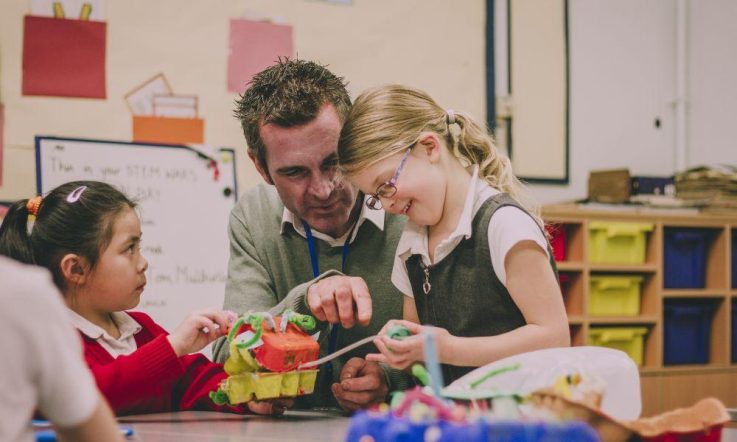Before we get into this episode, are you subscribed yet to the free weekly Teacher bulletin? Get a weekly wrap of our latest content straight to your inbox. Join our community by clicking on the sign-up button at our website, teachermagazine.com.
Thanks for downloading this podcast from Teacher – I’m Jo Earp. Developing an external partnership with academics is one way to bring research expertise into your school. The UQ Learning Lab sees multidisciplinary Science of Learning researchers work in partnership with educators and educational leaders. In this episode of School Improvement I’m joined by Jake Compton, Director of Academic Culture and a teacher in the Senior School at Canterbury College in Queensland. Staff there have been involved with the UQ Learning Lab since 2020 and have drawn on that external expertise to develop and implement a series of improvement projects. We’ll be talking about some of the work that’s been happening, how it’s evolved over the years, and the challenges along the way. I hope you enjoy the episode.
Jo Earp: Hi Jake, thanks very much for joining us at Teacher today. So, before we dive into the work that you've been doing through the UQ Learning Lab then, can you tell me a little bit about Canterbury College and also what your role there involves – you're the Director of Academic Culture.
Jake Compton: Yeah, yeah, of course. Canterbury, we're an ELC to year 12 Anglican College in Logan, which is about 30 minutes south of Brisbane and about 30 minutes north of the Gold Coast – so, pretty much between Brisbane and the Gold Coast. We're a large co-educational school, we've got about 1500 students, and we draw students from obviously our area in Logan, but also as far north as Brisbane, south to the Gold Coast and then west to the Scenic Rim as well. So, we're a pretty large school on large property in between Brisbane and the Gold Coast, there.
We’re an academic school, but we also champion an education that's grounded in academic success, participation and involvement in sports and the arts, as well as the development of a service mindset. So, [they’re] the students that we're hoping to produce, and what we consider world-ready students.
My role is the Director of Academic Culture. I sort of oversee and facilitate the development of quality pedagogy in the classroom, the professional development of staff and our relationship with external organisations in that space. It's a really interesting position. I really enjoy it and it's allowed me over the last 3 years to assist in the creation of our Learning Framework, which is based on the Science of Learning and contemporary research into high-impact learning, as well as facilitate and roll out a collegial and cooperative professional learning and growth plan for all staff and preservice teachers; so that there's alignment between our planning, professional development, digital physical spaces to that framework in the hopes that we can produce really high quality teaching and learning for our students.
JE: It sounds like an interesting role, you're helping upskill staff there; 1,500 students, how many staff are you working with then, that must be quite a large group?
JC: We're over 200 staff altogether; teaching staff, we're about 130 teaching staff from the ELC right through to year 12.
JE: Okay, excellent. So, Canterbury College is one of the schools that's been working with academics up there in Queensland. How did you get involved in the UQ Partner Schools Program? I'm interested in what the driver was for you.
JC: Yeah, Canterbury, we've been involved with UQ and the Learning Lab since 2020. So as I mentioned before, we've been on a journey where we've asked ourselves ‘What are the things that we can do to improve the outcomes and achievement for our students?’ in all of those fields. So, obviously part of that is, how do we draw on the research and evidence to inform that practice?
And when we heard about the Learning Lab and their focus on helping schools to bridge that research-translation gap in a way that was contextually relevant for their communities, it was an obvious choice for us to jump on board. Additionally, there are a number of other schools in our area as well that were part of the program, and we could see the impact that this was having for them.
When we first jumped in 2020, obviously Queensland had gone through, was going through its change from OP to ATAR, so we wanted to really understand: Did our students have the study habits and strategies to set them up for success? So, we joined UQ and the Learning Lab to explore what our students, what were their strategies and what were their study habits at that time, and then how could we develop a Learner's Toolkit for them, which would strengthen those and set them up for success in the new curriculum and the new requirements with that senior curriculum change?
JE: So, I’m guessing the UQ program looks slightly different for each school, because obviously you've all got different improvement priorities and different contexts and so on, but also that maybe what it looks like for your College even has evolved over the years. Would that be right?
JC: Yeah, definitely. Being involved, you see many different schools working on many different improvement projects, which is really interesting and a great reason to be part of the program itself.
But for us, yeah, we've been involved for 5 years, like I said, and we started off in 2020 looking at study skills and habits for students. That evolved into 2021, where we looked at how can we then support the development of that and the embedding of that by focusing on teacher development and use of those skills within the classroom. 2022 was how do we align what we're rolling out for students and what we're expecting [of] them with our pedagogical framework that we just developed.
In 2023, we undertook a project on how do we measure success and engagement of staff and students in the changes that had happened over the last couple of years. And this year, we're looking at what does student engagement mean at Canterbury and then how can we foster that, and what do we need to do as a school to ensure that we are maximising the engagement of all students in all lessons.
JE: So, you’ve been involved in some interesting projects and it’s interesting as well that you’re saying that those have developed over time and there’s obviously a logical link there – you haven’t been skipping from one thing to another to another. Can you give a few more details of what you’ve been doing?
JC: Yeah, I think 2023 was the big year for us; 2020 and 2021, we were developing the Learner's Toolkit for students and at that time we were also in the process of redesigning our Teaching and Learning Framework, or our pedagogical framework, and developing a professional learning plan that would sit alongside that. So, in 2022, we aligned what we were doing with students with our Teaching and Learning Framework for staff as well.
And then 2023 was the big year because we were running the first full academic year with that framework; embedded in that obviously the Learner's Toolkit for students and a new professional development and growth plan for staff, which was putting a big emphasis on communities of practice and collaborative work between all staff from ELC through the year 12 to drive improvement in teaching and learning in the planning, teaching and feedback space in our classrooms.
So, we used our project in 2023, our big project that year was we wanted to develop a tool – a survey and analysis tool – that would chart staff engagement with those changes. Because we want to know how effective this roll out would be for all staff within the college. And we're not just talking teaching staff there, we were thinking corporate staff as well as leadership as well. So, this was an open and branching analysis survey of what we thought would be the different levels of engagement with what we call the ‘Canterbury Way’ (which was our pedagogical framework). And we wanted to be able to track what was working well and why, and then where those unforeseen barriers [were] that were stopping our staff moving from one level of engagement to the next, and then how we could mitigate those barriers or overcome those barriers in the future.
It was a really interesting project, it was a really good project because what it did was it didn't answer the questions per se that we had about why things weren't working; what it did was it gave us a really valuable tool to ask new questions and sit down with different staff and figure out what discussions we needed to have to facilitate further improvement in that space.
If you’re enjoying the Teacher podcast channel, have you subscribed yet to the free Teacher bulletin? It’s the best way to get our latest stories straight to your inbox. In addition to a weekly wrap up of our latest content, subscribers to the bulletin can receive Teacher Trending, where we share our top 5 pieces of content on a trending topic, and special editions where we share a bonus piece of content with you. The sign-up process is easy – just visit our website, teachermagazine.com and click on the sign-up button on the righthand side of the homepage.
JE: So, Jake, sometimes what happens with external partnerships is it will be for a short period – for one specific thing – and then that will be the end of it. Or perhaps someone that’s driving it within the school will leave and then it will finish. This sounds long-term and ongoing, and you’ve got continuing input from Dr Stephanie MacMahon and the UQ team on the research and evidence side of things. We’ve been talking about the research to practice but I’m interested as well has this work actually informed the research side of things for the university? Have you been able, as a school, to feed back into that research-practice loop from an educator perspective?
JC: Yeah, we have to a certain extent. The Learning Lab under Stephanie and her team, they use our work to inform and present their framework for knowledge mobilisation in school settings. And often schools and members of different teams from different schools contribute to panel discussions and even talk to postgraduate students about the work that's happening in schools, as well as the challenges that are faced and the measures that are used to overcome them. So, there is that feedback loop in that sense, when we're talking about research to practice.
But I think one of the major feedback loops that is really valuable is that by being part of research projects and continued research projects, like you said, it's allowing us I know from Canterbury to become much more confident researchers of our own community, and therefore we're much more confident in driving change in that teaching and learning space for our College, but also championing that and celebrating that.
So, what I'm seeing is greater and more collaboration between schools and teams that are sharing their research, sharing their findings, sharing their improvement plans, which is then fostering further growth and change in that space as well.
JE: So, it sounds like it's an exciting time, sharing that practice and those plans, and like you say the issues educators are grappling with too. Dr Stephanie MacMahon and the team, and some of the other schools involved in the program, have also shared what’s been happening through previous Teacher articles – and I’ll put links to those in the transcript of this podcast over on teachermagazine.com if you’d like to do some further reading after this episode. So, Jake, for other teachers and leaders listening then who are thinking about starting out on this kind of research-based improvement journey, and maybe working with external agencies or other schools as well, what are some of the challenges that you faced along the way? I may be wrong, but the big one that jumps out certainly for me is time.
JC: You are definitely not wrong. No, time is one of those things – there's never enough of it, and there's always too much to do. Time definitely. I'll, start with that because I think the time challenge is multifaceted.
Firstly, the time to undertake research and to form a truly collaborative team in a school setting, is really difficult. Often when you're doing these projects with external organisations, especially universities, their perception on time is a little bit different to a schools’. Like, we’re often bound your timetable, the term, the semester and then the year; and then things slow down and then they kick back off again the following year. So, time is definitely one of the challenges there in that.
And I think the way that you can overcome that is leadership teams that really need to be unapologetic in crafting out time in their sequence throughout the year for these research partnerships. And I think the time part is important to consider as well, because often it is leadership – middle leadership, upper leadership or senior leadership – that have more time because they usually teach less classes, or they're in the classroom a little bit less; so, they will be the ones in these groups. But if you don't find a space for that time where it can be truly collaborative, where everyone from teacher aides to classroom teachers to pastoral leaders to middle leaders to upper leaders are working together on that, then it can become another barrier as it can be seen as, or it can feel as, ‘this is a top-down project’ and it's a top-down push for change and there's not that great sense of ownership across the whole staff.
And then another one there is, or what we’ve found is we're starting to bridge or we're bridging the research-translation gap where we're taking a lot of research from universities and from other areas and bringing it into school, and teachers are on board and teachers understand the value of it and they like it, but then you're finding other gaps or barriers within your own school to, not the knowledge and its value, but how is this embedded and then sustained and then scaled over a number of years as well.
So, a big challenge is how do you construct the change so that the ownership of the project and what you're hoping to do goes beyond just the research project itself, or just the year it's being focused. And it's one of the reasons that we've been involved for a number of years and our projects have involved the way they have is we're looking at how do we make sure that the changes that we're rolling out are sustainable and scalable by all within the College over a long period of time and not just while this project's happening or why it's being spoken about in staff meetings this year or next year and from there.
So that was one of the really interesting things we found and it's identifying your drivers of change in the school beyond just your research group or just beyond maybe your traditional or established leaders in those positions and seeing how you can facilitate and ensure that they have time and space [and] confidence to continue the work that you've done.
JE: So, one of the key messages then is to give it time – both in the sense of time to do it, but also to make it long term and sustainable, give it support and aim for a long-term way of working rather than, you know, that big thing that we're doing this year and then we'll forget about it next year. In terms of the future, then, we're what, roughly kind of halfway through the school year here in Australia – what’s the aim for Canterbury College for the rest of the school year in terms of the work that you're doing on this research partnership?
JC: Yeah, so, we’re undertaking a new project this year, we're looking at student engagement and we're looking specifically at student engagement in the classroom and what does that look like? I think there's been a lot of discussion and there's a lot of noise around students’ engagement or their lack of engagement in class. So, we really want to understand what student engagement looks like at Canterbury, the different perspectives on student engagement – from both really a student perspective as well as a teacher perspective – so that we can then create some professional learning opportunities and communities of practice from 2025 onwards that facilitate and enhance student engagement in the classroom.
And then we'll obviously be going back to that staff survey of engagement on what we've been doing, for a second year to measure how well the changes we made based upon the feedback from last year have worked, and then what changes we’ll make to strengthen it even further in 2025.
JE: Well, good luck with that ongoing work and we'd love to catch up with you again in 2025 to hear how that new project is progressing and some of the things you and the team there have learned from it. For now, though, thanks Jake for sharing what you’ve been doing there at Canterbury College and your expertise with Teacher.
JC: Thank you very much. Thank you for the time, thank you for the opportunity.
That’s all for this episode, but we’d love to hear what’s happening at your own school. You might be involved in a school improvement project, working on a collaboration with external organisations, or just want to share your own experiences and expertise. Email the team at teachereditorial@acer.org with the details. A reminder that there are more than 300 podcasts in the Teacher archive if you want to keep listening now. And please leave a rating and a review – it helps people like you to find the podcast and it’s a great support for the Teacher team.
Before you go, are you currently subscribed to the weekly Teacher bulletin? It’s a free weekly wrap of our latest content straight to your inbox. Join the more than 40,000 educators who are already part of the community by clicking on the sign-up button at our website, teachermagazine.com.
As a school leader, or classroom practitioner, how do you keep up to date on research into effective teaching practices? How does this inform your own practice in your own context?
If you are planning to undertake an action research project or introduce an intervention program: What student learning or wellbeing outcomes do you want to achieve? What evidence and data will you collect and when? How will you measure the impact?



